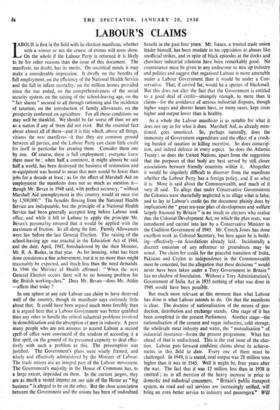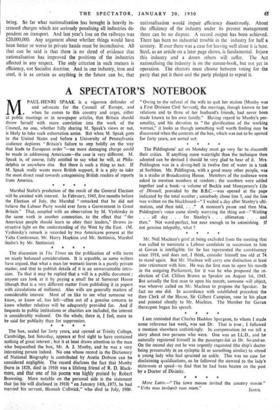LABOUR'S CLAIMS
LABOUR is first in the field with its election manifesto, whether with a winner or not the course of events will soon show. On the whole if the Labour Party is returned it is likely to be for other reasons than the issue of this document. The manifesto, no doubt, has its merits. On uncritical minds it may make a considerable impression. It dwells on the benefits of full employment, on the efficiency of the National Health Service and the fall in infant mortality, on the million homes provided since the war ended, on the comprehensiveness of the social security system, on the raising of the school-leaving age, on the " fair shares " secured to all through rationing and the incidence of taxation, on the introduction of family allowances, on the prosperity conferred on agriculture. For all those conditions we may well be thankful. We should be far worse off than we are as a nation if any of them did not exist. But the essential fact about almost all of them—and it is this which, above all things, vitiates the new manifesto—it that they are common ground between all parties, and the Labour Party can claim little credit for itself in particular for creating them. Consider them one by one. Of course, there is full employment ; everyone knew there must be ; when half a continent, it might almost be said half a world, has been destroyed the business of restoration and re-equipment was bound to mean that men would be fewer than jobs for a decade at least ; as for the effect of Marshall Aid on employment the manifesto does not so much as mention it— though Mr. Bevan in 1948 said, with perfect accuracy, " without Marshall Aid unemployment in this country would at once rise by 1,500,000." The benefits flowing from the National Health Service are indisputable, but the principle of a National Health Service had been generally accepted long before Labour took office, and while it fell to Labour to apply the principle Mr. Bevan's personality ensured that it would be applied with the maximum of friction. So all along the line. Family Allowances were law before the last General Election. The raising of the school-leaving age was enacted in the Education Act of 1.944, and the date, April, 1947, foreshadowed by the then Minister, Mr. R. A. Butler, in that year. As for housing, what has been done constitutes a fine achievement, but it is no more than might reasonably be expected, and much less, than the need demands. In 1946 the Minister of Health affirmed: " When the next General Election occurs there will be no housing problem for the British working-class." Does Mr. Bevan—does Mr. Attlee —affirm that today ?
In one sphere at any rate Labour can claim to have deserved well of the country, though its manifesto says curiously little about that. It could have been argued much more forcibly than it is argued here that a Labour Government was better qualified than any other to handle the critical industrial problems involved in demobilisation and the absorption of men in industry. A great many people who are not anxious to accord Labour a second spell of office were convinced of the wisdom of according it a first spell, on the ground of its presumed capacity to deal effec- tively with such a problem as this. The presumption was justified. The Government's plans were wisely framed, and wisely and effectively administered by the Minister of Labour. The trade unions are an integral part of the Labour movement. The Government's majority in the House of Commons has, to a large extent, depended on them. In 'the current jargon, they are as much a vested interest on one side of the House as "big business " is alleged to be on the other. But the close association between the Government and the unions has been of undoubted benefit in the past four years. Mr. Isaacs, a trusted trade union leader himself, has been resolute in his opposition to abuses like unofficial strikes, and in spite of black episodes at the docks and elsewhere industrial relations have been remarkably good. No countenance must be given to any endeavour to mix up industry and politics and suggest that organised Labour is more amenable under a Labour Government than it would be under a Con- servative. That, if carried far, would be a species of blackmail. But this does not alter the fact that the Government is entitled to a good deal of credit—strangely enough, to more than it claims—for the avoidance of serious industrial disputes, though higher wages and shorter hours have, in many cases, kept costs higher and output lower than is healthy.
As a whole the Labour manifesto is as notable foi what it does not say as for what it does. Marshall Aid, as already men- tioned, goes unnoticed. So, perhaps naturally, does the immensity of Government expenditure and the effect of a crush- ing burden of taxation in killing incentive. So does conscrip- tion, and indeed defence in every aspect. So does the Atlantic Treaty ; so does the United Nations, apart from the suggestion that the purposes of that body are best served by still closer associations between friendly countries within it. Altogether it would be singularly difficult to discover from the manifesto whether the Labour Party has a foreign policy, and if so what it is. More is said about the Commonwealth, and much of it very ill said. To allege that under Conservative Governments the Colonies were shamefully neglected is to allege what is false, and to lay to Labour's credit (as the document plainly does by implication) the " great ten-year plan of development and welfare largely financed by Britain " is an insult to electors who realise that the Colonial Development Act, on whicirthe plan rests, was introduced and carried into law by a Conservative Minister in. the Coalition Government of 1945. Mr. Creech Jones has done excellent work as Colonial Secretary, but here again he is build- ing—effectively—on foundations already laid. Incidentally a discreet omission of any reference to groundnuts may be noted. The claim for credit for the peaceful transition of India, Pakistan and Ceylon to independence in the Commonwealth must be conceded, but the allegation that these decisions " would never have been taken under a Tory Government in Britain " has no shadow of foundation. Without a Tory Administration's Government of India Act in 1935 nothing of what was done in 1948 would have been possible.
But much more relevant at this moment than what Labour has done is what Labour intends to do. On that the manifesto is clear. The doctrine of nationalisation of the means of pro- duction, distribution and exchange stands. One stage of it has been completed in the present Parliament. Another stage—the nationalisation of the cement and sugar industries, cold storage, the wholesale meat industry and water, the " mutualisation " of industrial insurance—forms the present programme. What lies ahead of that is undisclosed. This is the real issue of the elec- tion. Labour puts forward confident claims about its achieve- ments in this field to date. Every one of them must be challenged. In 1949, it is stated, coal output was 28 million tons higher than it was in 1945. Well it might be, four years after the war. The fact that it was 12 million less than in .1938 is omitted ; so is all mention of the heavy increase in price to domestic and industrial consumers. " Britain's public transport system, as road and rail services are increasingly unified, will bring an even better service to industry and passengers." Will bring. So far what nationalisation has brought is heavily in- creased charges which are seriously penalising all industries de- pendent on Transport. And last year's loss on the railways was £20,000,000. Any argument about whether things would have been better or worse in private hands must be inconclusive. All that can be said is that there is no shred of evidence that nationalisation has improved the positions of the industries affected in any respect. The only criterion in such matters is efficiency, not Socialist doctrine. And in one industry, iron and steel, it is as certain as anything in the future can be, that nationalisation would impair efficiency disastrously. About the efficiency of the industry under its present management there can be no dispute. A record output has been achieved. There has been no industrial trouble in the industry for half a century. If ever there was a case for leaving well alone it is here. Steel, as an article on a later page shows, is fundamental. Injure this industry and a dozen others will suffer. The Act nationalising the industry is on the statute-book, but not yet in operation. The electors must choose between voting for the party that put it there and the party pledged to repeal it.



































 Previous page
Previous page